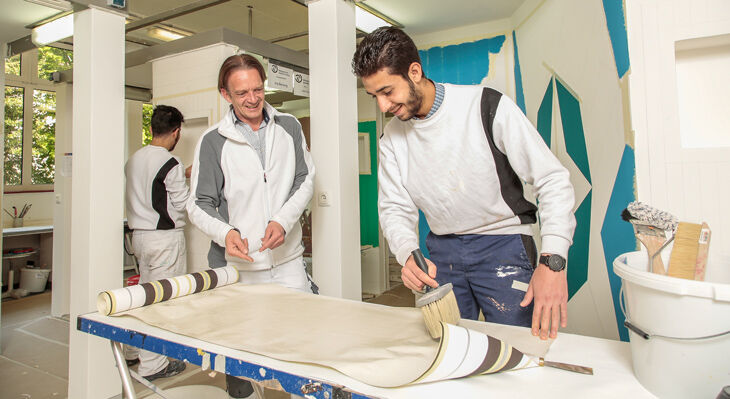Career orientation for refugees
An intensive vocational orientation programme of up to 26 weeks’ duration opens up routes into vocational education and training for refugees. Young refugees who are no longer subject to compulsory education prepare to enter training in a craft trade whilst receiving ongoing support along the way.

The “Career Orientation for Refugees” Programme of the Federal Ministry of Education and Research (BMBF) provides young refugees with detailed insights into training occupations in the craft trades sector. Throughout the whole of the scheme, they learn specialist terminology and knowledge for the training occupation they aspire to enter and receive individual assistance from a project support worker. The “Career Orientation for Refugees” Programme takes place in workshops and at companies.
It forms part of the “Routes into training for refugees” measure, a joint training initiative being undertaken by the BMBF in conjunction with the Federal Employment Agency (BA) and the German Confederation of Skilled Crafts (ZDH). The objective is for up to 10,000 young refugees to be given the chance to train in a craft trade occupation.
Workshop sessions provide more detailed vocational orientation
Special sessions are staged at the workshops of inter-company vocational training centres run by the craft trade organisations or their cooperation partners. These workshop sessions provide participants with the opportunity to take a close look at between one and three training occupations which they believe could be right for them. They spend a minimum of nine and a maximum of 18 weeks discovering whether the selected occupations actually match their personal suitability and preference.
During the workshop sessions, they also learn more about the structure and contents of dual training in the occupations they have chosen and prepare for the demands of vocational school.
Company-based phase to test out the preferred occupation
Participants opt for a training occupation on the basis of the experiences they have gained during the workshop sessions. They then complete a company-based programme phase at a craft trades firm in order to test out this occupation further. They spend a minimum of four weeks and a maximum of eight weeks at the company, during which time they apply the competences previously acquired in operational practice. They experience work processes at first hand and are able to familiarise themselves with the company. By the same token, the firm also has the opportunity to meet potential trainees.
Imparting of occupationally related language knowledge
During the workshop sessions, participants receive intensive language and specialist language teaching. This language knowledge is further enhanced during the subsequent company-based phase.
Part-time model is available

Refugees may also complete the Career Orientation Programme on a part-time basis. This ensures, for example, that the scheme is also open to young women and men with childcare responsibilities. Participants are also eligible for support with the organisation of childcare arrangements.
Networking with local partners
Networking with relevant partners within a region is a further crucial aspect in terms of acquiring participants. Such an approach enables more young refugees to be given information on the contents of the programme and the opportunities it affords. In order to allow networking to take place, application may be made for additional funding for up to half a full-time equivalent post.
Support throughout the whole of the measure
All participants benefit from robust support that is tailored to meet their individual needs. Project support workers provide them with regular verbal feedback and with written documentation of learning progress. Support staff also ensure placement in training or in a further measure as the case may be. Another additional option open to participants is coaching via the so-called Senior Expert Service (SES). This assistance is provided by specialists in the various fields who are now in retirement.
If no direct transition to training is possible, participants can undergo further preparation for this step via a further measure (such as introductory training or a company-based practical placement).
Project funding
Amended funding guidelines for the BMBF’s Career Orientation for Refugees Programme entered into force on 29 August 2017. These replace the guidelines issued on 7 April 2016 and are valid until 31 June 2020. Measures must be concluded by 31 December 2019.
The funding stipulations contained within the guidelines of 7 April 2016 apply in respect of applications that were approved prior to the entry into force of the amended guidelines. Notwithstanding this, application may be made for transfer of the funding provisions of the guidelines from 29 August 2017 to measures already agreed.
“Routes into training for refugees”
The aim of the “Routes into training for refugees” programme, which is a joint initiative by the BMBF, the BA and the ZDH, is to prepare young refugees no longer subject to compulsory education for progression to company-based training in the craft trades sector via a multi-stage procedure comprising an integration course followed by general and detailed vocational orientation. The initiative was launched at a joint press conference staged on 5 February 2016.
“Routes into training for refugees” training initiative
The “Career Orientation for Refugees Programme” forms part of the “Routes into training for refugees” measure, a joint training initiative being undertaken by the BMBF in conjunction with the Federal Employment Agency (BA) and the German Confederation of Skilled Crafts (ZDH). The objective is for up to 10,000 young refugees to be given the chance to train in a craft trade occupation.
